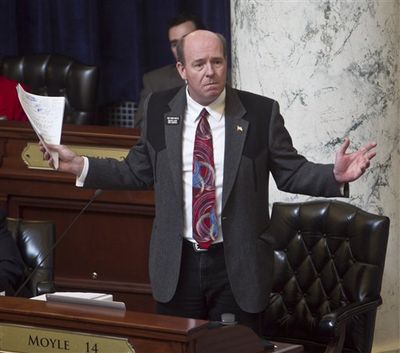Idaho House backs Otter’s exchange

BOISE – North Idaho representatives split 7-7 late Wednesday, as the Idaho House, after a feisty seven-hour debate, approved Gov. Butch Otter’s proposal for a state-based health insurance exchange on a 41-29 vote.
The proposal now moves to the Senate, but that chamber passed an earlier version on a 23-12 vote, so the latest bill, HB 248, is expected to pass. It’s a key victory for the GOP governor, whose opponents on the bill railed against Obamacare and warned of socialism and ruin.
Rep. Kathy Sims, R-Coeur d’Alene, said if Idaho approves a state insurance exchange, “It would represent the greatest expansion of the welfare state in our country in a generation, and possibly in history.”
Rep. Ron Mendive, R-Coeur d’Alene, compared the bill to the “Real ID” law that Idaho opposed, and said a card for the new health exchange will be “Real ID on steroids. … Privacy as we’ve known it in this country will cease to exist.”
Backers, however, said if Idaho didn’t set up its own exchange, the federal government would operate one for Idaho, a move they called a worse fate.
“Our choice is between state sovereignty and federal control,” said Rep. Luke Malek, R-Coeur d’Alene. “If we give up control we will never get it back.”
Under the 2010 Patient Protection and Affordable Care Act, all states must have an insurance exchange, an online marketplace where consumers can shop for health insurance plans and access new government subsidies, by Jan. 1. They can develop their own, or have the federal version imposed on them.
Last year, Idaho lawmakers held off on any decision, betting first that the national health care overhaul would be overturned in court, and then that Republican Mitt Romney would defeat President Obama and repeal the law. Neither happened.
Though 25 other GOP-led states are refusing to set up state exchanges, Otter and his House allies concluded that Idaho will have the most control and least federal interference with its own exchange. The bill, HB 248, calls for an independent exchange in which participation would be voluntary, both for consumers and for those offering insurance plans. It couldn’t receive any state tax funding, and Otter said it would charge lower fees to Idahoans than a federal exchange.
House Majority Leader Mike Moyle, R-Star, maintained the feds would remain in control, and said passing a state exchange only makes Idaho the federal government’s “sock puppet.”
Rep. Fred Wood, R-Burley, the House Health and Welfare chairman and the bill’s lead House sponsor, said simple economics spoke for a state-based exchange, arguing it would employ Idaho residents wherever practical and possible.
“You think the federal government’s going to do that?” Wood said. “No. And you and I both know it.”
Rep. Frank Henderson, R-Post Falls, said, “I have always believed that the private sector could perform the function of an exchange better and more efficiently than a similar service housed in a state or federal governmental agency. However today, since that ambition wasn’t fully achieved, it’s my opinion that HB 248 fulfills that ambition to the greatest extent possible and practical.” The state exchange, he said, “will be totally independent and will be self-sustaining, and … will provide us with the local control that I think is so essential.”
Twenty-eight House Republicans joined all 13 House Democrats to support the bill; voting against were 29 House Republicans.
The Associated Press contributed to this report.